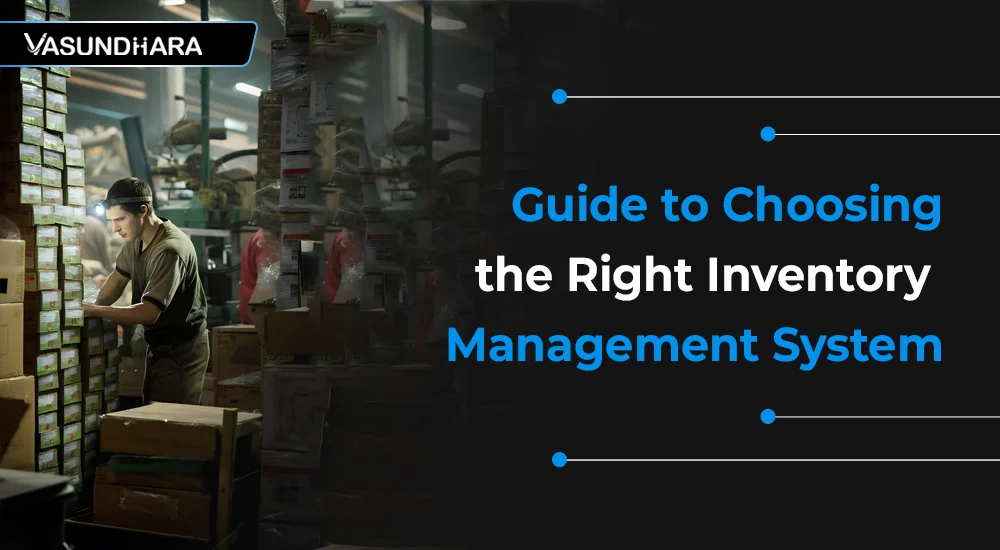Inventory Management System: A Buying Guide


- Jun 21, 2023
Managing inventory used to be a time-consuming and error-prone task that relied mainly on paper-based recordkeeping.
It goes without saying that more paper always means more people. However, the introduction of contemporary technology and the installation of inventory management systems have transformed the way firms manage their inventories.
Using an inventory management system to track inventory will boost your warehouse efficiency immediately.
This revolutionary change from traditional to digitization has resulted in several benefits and streamlined operations in unimagined ways.
Inventory is a crucial component of any business model. Keeping a close eye on inventory movement can make or destroy a business, which is why entrepreneurs always emphasize inventory management.
In this article, we will discuss in detail the importance of inventory management systems and how it can help digitize your business, streamline operations, and improve efficiency.
An inventory management system is software that helps businesses track what they have in stock.
Inventory management systems can be used to keep track of a wide range of things, from raw materials to finished goods.
They can also help businesses make plans and budgets by giving them real-time information about how much stock they have and how sales are going.
Also, these systems usually have features that let users set reorder points for goods and get notifications when stock is getting low.
One of the most crucial assets a business may have is inventory. In companies with high inventories, including food production and retail, an organization's inputs and finished goods are the basis of its operations.
Businesses may properly and promptly complete orders using an effective inventory management system.
They can keep track of, monitor, and manage inventory while avoiding problems like understocking, overstocking, stocking obsolete items, high return rates, and customer loss.
A well-organized warehouse produced by an effective inventory management strategy facilitates more effective fulfillment strategies.
If you wish to minimize financial bottlenecks, inventory management is essential.
It assists in avoiding pointless capital locking up in excess inventory while enhancing the firm's liquidity position.
Business managers can make more informed judgments about the inventory in their warehouse if they have an inventory tracking system in place.
There are four types of inventory: Raw Materials, Work-In-Process (WIP), Finished Goods, and Maintenance, Repair, and Overhaul (MRO).
Knowing the type of inventory you have allows you to manage it more effectively and practice better inventory control.
To handle all of that goods, you must select the best inventory management system.
Raw materials are substances that are required to transform your inventory into a finished product.
These inventory items are fragments of component parts that are presently on hand but have not yet been incorporated into either the work-in-process or the finished goods inventories.
Raw materials come in two varieties: direct and indirect. Direct materials are used in completed goods directly, whereas indirect materials are incorporated into overhead or manufacturing costs.
Work-In-Process (WIP) inventory is, as the name suggests, inventory that is currently being worked on. When it comes to costs, WIP is made up of raw materials (and, occasionally, labor charges) that are still "in production" at the conclusion of the accounting period.
In other words, WIP inventory includes any direct and indirect raw materials that your company uses to produce completed goods.

The finished goods inventory is conceivably the easiest to understand of all inventory kinds.
That stock that you have on your website offered for sale? They are completed things. This category includes any item that is prepared to be sold to your clients.
MRO inventory, also referred to as maintenance, repair, and operating supplies, is all about the little things. Inventory is something that is needed to assemble and market the finished product but is not a part of it.
This inventory may be in storage, at a supplier, or in transit for delivery, depending on the details of your firm.
Gloves used to handle product packaging, for instance, would be categorized as MRO. These might also include common office supplies like pens, highlighters, and paper.
There are 4 fundamental types of inventory management systems:
The definition of periodic helps you understand this type of inventory management system. In this system, you count inventory periodically instead of constantly.
These inventory systems are commonly used with basic inventory management software such as Excel.
Perpetual inventory management system is defined as software that constantly estimates inventory based on computer data.
A perpetual inventory management system is a programme that estimates your inventory on a constant basis based on your computer data rather than a physical inventory.
In a perpetual inventory system, you or inventory software counts inventory perpetually as soon as it moves.
Inventory management systems commonly work with more robust inventory management software. You can also use it with Excel.

Barcode inventory systems use numbers to identify each product being sold.
The barcode numbers can represent several different pieces of information related to the item, including the supplier and manufacturer, location of the product, weight, the amount of each item in stock, and so on.
There are two main types of barcode:
RFID is a technology that uses radio waves between a tag (a tiny microchip) and a reading device.
The reader reads data from the tag, which usually includes an identifying inventory number or product-related information such as stock and batch numbers and production dates.
Any business that sells products requires a dependable inventory management system.
Using barcodes, point-of-sale software, and warehouse monitoring, computerized inventory management systems make it simple for businesses to maintain a constant level of accuracy.
As with the implementation of any new system, business proprietors should weigh the advantage of inventory management system and disadvantages of inventory management system before writing a check.
| Helps maintain the right amount of stocks | It helps maintain a balance where your inventory is operating at its highest efficiency |
| Results in a more structured warehouse | You can organize your warehouse quickly and easily with the help of an effective inventory management system. |
| Reduces waste and costs | A business can save time and money by implementing an efficient inventory management system. |
| Avoid lawsuits and regulatory fines | Inventory management enables you to maintain organization in your warehouse or facility. |
| Organize maintenance | You can give work orders to your personnel, and monitor whether the maintenance was actually performed. |
| Decreased holding costs | It helps reduce expenses including warehouse rent, personnel pay, electrical prices, security, and related to finance. |
| Flexibility | The manager will be able to be adaptable and deal with new conditions if they are managed effectively. |
| More transparent information flow | You learn when to place an order for more of any product and when to reduce or increase your stock. |
| High implementation costs | Even once the pricey system is installed, frequent maintenance and upgrades are still required, adding to the overall cost. |
| Impersonal touch | The human touch that makes a company stand out from the competition can frequently be lost as infrastructure grows. |
| Production problem | It can disguise manufacturing issues that could have a disastrous impact on customer service. |
| Increased space to hold the inventory | you will require workers, forklifts to transport the stock, and shelves and racks to store your products. |
| Bureaucracy | Even with a high amount of inventory, a company may still need to store a lot of items, which requires storage space and perhaps additional operational expenses. |
| Complexity | Some inventory management techniques and tactics may be overly complicated and challenging for workers to comprehend. |
Modern inventory management systems are in demand due to developments in computing, applications, databases, and IT operations.
The transition to web services, application-based development, and APIs enabled previously impossible third-party application integrations. Now, inventory management systems can manage a variety of essential business functions relating to inventory.
Consider the following features of inventory management system, which you can tailor to the requirements of your business and which go beyond inventory control:
No matter the type of business, inventory backup and security are essential for the inventory to function properly.
Good security elements in inventory management system software make hacking impossible.
In the event that inventory management software is compromised, business administrators have access to a backup of the data.
Consequently, backup and inventory security prevent any disruptions.
Manual data processing can result in errors, but barcode scanning saves employees a substantial amount of time.
The barcoding function reduces employee training time and cost. Historically, documenting the data of the products has been laborious.
By providing barcoding and identifying capabilities, the inventory management system has made the process simpler. Now, the greatest amount of labor is accomplished in the shortest amount of time.
When a company's products run out of stock, it's a very distressing situation. A system for managing inventory enables you to monitor which products run out of stock and which products are abundantly available.
This is a particularly advantageous method for maintaining a positive user experience and conserving resources. Consequently, business proprietors purchase inventory with intelligence and prudence.
This feature of the inventory management system assists managers in meeting customer expectations and reducing the likelihood of stock-outs.

The days of manually supervising inventory are over. Now, managers do not need to devote significant time and effort to the administration of stock data.
An excellent inventory management system includes an alert for stock-outs. In the alerts, the software describes the various issues that may arise as a result of the depletion of a particular item's stock.
Reporting on various business activities is one of the inventory management system's most advantageous features.
Management of an inventory business necessitates that those in control keep abreast of various business activities, such as the location of the driver, the status of the product, shipment details, etc.
You can incorporate numerous reporting tools into the inventory management application for efficient task completion.
The inventory management system is a cloud-based application that is accessible from any device.
In addition, IoT-driven inventory management system software makes it simpler to record all inventory details efficiently and intelligently.
IoT optimizes and organizes the inventory efficiently. All company employees have access to real-time updates.
Here we break down the inventory management strategies of successful manufacturers and retailers around the globe.
More than half of the goods sold on Amazon Marketplace come from businesses other than Amazon. This is why Vendor Managed Inventory (VMI) is the best way for this global eCommerce giant to keep track of its stock.
The Amazon inventory management system has a "trajectory alert" that automatically sends reorder alerts based on the number of sales on days chosen by the seller.
This lets the vendor account for lead times.
In conclusion, an inventory management system can be a lifesaver for retail businesses, especially expanding businesses.
Using inventory management software will make it simpler to organize your schedule. You will be able to anticipate demand for inventory items, allowing you to have supplies in a more efficient manner.
You will then be significantly more productive and swifter, in addition to saving money. Overall, it can save you a great deal of time and money and help in order management.
Therefore, a solid software solution is essential. Choosing the right inventory management system is a challenge.
Still confused? Do you require expert guidance? You can contact us, and one of our experts at Vasundhara Infotech will assist you in developing an action plan for the optimal administration of your stocks.
Copyright © 2026 Vasundhara Infotech. All Rights Reserved.
